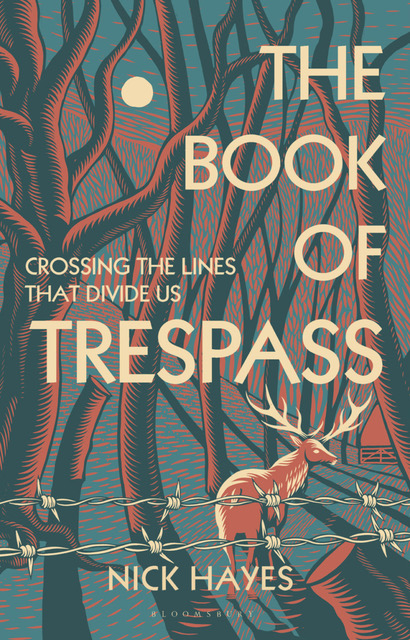Tuesday
UncategorizedA Review of “The Book of Trespass: Crossing the Lines that Divide Us”
By Nick Hayes
Reviewed by Gregory Webster
 What happens to a people estranged from their ancestral lands? Where access is criminalised for the benefit of a privileged elite? This is the story of England as told by Nick Hayes in The Book of Trespass. Using the vehicle of a series of trespasses across properties owned by the landed gentry, media magnates, politicians, and private corporations, Hayes examines a sorry history of exclusion and dispossession over many hundreds of years.
What happens to a people estranged from their ancestral lands? Where access is criminalised for the benefit of a privileged elite? This is the story of England as told by Nick Hayes in The Book of Trespass. Using the vehicle of a series of trespasses across properties owned by the landed gentry, media magnates, politicians, and private corporations, Hayes examines a sorry history of exclusion and dispossession over many hundreds of years.
We hear the stories of a people ripped from the land that had sustained them for centuries. Through various instruments of legislation and sometimes brutal oppression, the Commons of England were slowly privatised, and the people made unwelcome in much of the land of their birth. As Acts of Parliament – passed by the landowning elites – legitimised the stealing of the land and its resources, the Commoners, who relied on it for their livelihoods, were shut out and criminalised, forced to live on the margins, or in the crushing squalor and pollution of the industrial cities. And of course, the methodologies developed were not wasted. England was essentially a petri dish for the subsequent colonisation and oppression of many other lands and peoples.
Whilst this could have been an unremittingly dark tale, Hayes mitigates this beautifully through his own dalliances in those forbidden places; the sheer exquisite joy of nature thrumming around him jumps from the page – he articulates what we are missing. Hayes also happens to be an accomplished graphic novelist, and each chapter of the book is illustrated by his wonderfully stylised faux-linocut illustrations of the places he trespasses upon.
The stories of civil disobedience, witches, uprisings, and mythical figures are thrillingly told, but perhaps most interesting is the examination of what this accumulated division means today, the inherent separation from wild/cultured nature that has become so normalised. It is perhaps no wonder that the UK is now one of the most biodiversity depleted countries in the world when one realises this history of enforced separation from, and exploitation of, these sacred lands.
There are plentiful supplies of amazing and often shocking facts too; who knew that the act of trespass could become “aggravated trespass” in the eyes of the law by simply writing a poem, or singing a song, or sketching the landscape – or indeed doing anything! – when on private land? Perhaps the fact that we are currently excluded from 92 per cent of the land in England by law of trespass should tell us loud and clear that something is very wrong at the heart of Albion.
Through landscaped country parks, peace camps, titled families with stately homes built on the whiplashed backs of the slave trade, hunting estates and posh music festivals, the trespasses Hayes undertakes culminate with the Herne Oak, on Home Park, Windsor, part of the Crown Estate – so a whole different level of illegal. Did he reach that ancient storied tree and rest under its shading boughs? I’ll leave that for you to find out.
♦

 Gregory Webster is a Trustee of the Berkshire, Buckinghamshire and Oxfordshire Wildlife Trust, the Chair of ecological consultancy Future Nature WTC, and a member of the Shambhala Touching the Earth Collective steering committee. He lives and works in Oxford, England. https://shambhalaonline.org/touching-the-earth/
Gregory Webster is a Trustee of the Berkshire, Buckinghamshire and Oxfordshire Wildlife Trust, the Chair of ecological consultancy Future Nature WTC, and a member of the Shambhala Touching the Earth Collective steering committee. He lives and works in Oxford, England. https://shambhalaonline.org/touching-the-earth/
















